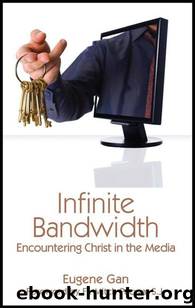Infinite Bandwidth: Encountering Christ in the Media by Gan Eugene

Author:Gan, Eugene [Gan, Eugene]
Language: eng
Format: epub
Tags: General Fiction
Publisher: Emmaus Road Publishing
Published: 2010-10-01T04:00:00+00:00
SPEAKING TRUTH
As with the other media keys, the fourth media key isn't just about the films and television shows we watch. It's also about keeping truth at the heart of the media we make and use. In the world of blogs, podcasts, social networking sites, and online forums, we all, at least potentially, are media-makers. We can all âmakeâ media that leads people to the truth, and we can all use media in a way that obscures truth.
We âmakeâ media that leads people to the truth when we use our blogs or Facebook pages not just to gossip or report on the more mundane aspects of our life, but to talk about what really matters to us and why. Our blog can be a vehicle for articulating our struggles with the culture, our questions about the Faith, or our journey to God. In online forums we can evangelize, and on social networking sites we can post interesting articles about faith or culture that can spark discussions among friends from various viewpoints. Even posting pictures of our children on a social networking site can communicate some of the truth about Catholic family life. In all those ways, our use of the social media reflects and promotes an understanding of truth.
But those forms of media also make it particularly easy to let lies, both big and small, worm their way into our use. There are the obvious lies, the lies that began this chapter, designing avatars or online personas that have no grounding in who we really are. But there are plenty of lesser lies we can tell without pretending to be of a different, sex, race, or species.
For example, it's for good reason that Facebook has earned the nickname âFakebook.â All too often the profiles we devise for ourselves don't represent who we are, but who we want people to think we are. We can leave out the details we don't like, overemphasize the ones we do, and present to the world an idealized and ultimately false picture of our life. 34
In online forums and chat rooms, it's equally possible to mask our identities, as well as to do or say things we would never do in real life (like hurl insults at a perfect stranger). The Internet affords an anonymity that can embolden us to violate charity. It's easy to throw out insults or spread malicious gossip when we can't see the pain our words inflict.
It's also easy to cheat. Several years ago, one British professor characterized higher education in the UK as a âcut and paste culture.â Those same words can just as easily be applied to the U.S. Thanks to the vast amount of content easily searchable online, not only can students copy and paste passages from articles they read into their own Word documents, but they also can purchase ready-made research papers from websites like essayprofessors.com. According to a 2005 Duke University study, at least 40 percent of America's college students admit to passing off material they found online as their own.
Download
This site does not store any files on its server. We only index and link to content provided by other sites. Please contact the content providers to delete copyright contents if any and email us, we'll remove relevant links or contents immediately.
What Is the Gospel? (Foreword by D. A. Carson) by Greg Gilbert(990)
Jesus in Me by Anne Graham Lotz(974)
Daily Strength: Devotions for Bible Believing Study by Douglas Stauffer & Andrew Ray & Rick Quatro(900)
Christian Ethics by Wilkens Steve;(860)
The Practice Is the Path by Tias Little(824)
New Morning Mercies by Tripp Paul David(811)
Cleaning Up Your Mental Mess by Dr. Caroline Leaf(741)
Veritas: A Harvard Professor, a Con Man and the Gospel of Jesus's Wife by Ariel Sabar(735)
Greatest Mystery in the World by Og Mandino(668)
The Creative Call by Janice Elsheimer(607)
No More Christian Nice Guy by Paul Coughlin(591)
Our Appointment with Life by Thich Nhat Hanh(576)
Monastic Archaeology by Unknown(569)
2084 by John C. Lennox(560)
This One Wild and Precious Life by Sarah Wilson(546)
Jesus--Awesome Power, Awesome Love (Discover 4 Yourself® Inductive Bible Studies for Kids) by Kay Arthur(535)
The Catholic Verses: 95 Bible Passages That Confound Protestants by Dave Armstrong(531)
The Duties of Parents by J.C. Ryle(519)
The Tale of the Tardy Oxcart (Swindoll Leadership Library) by Swindoll Charles R(507)
